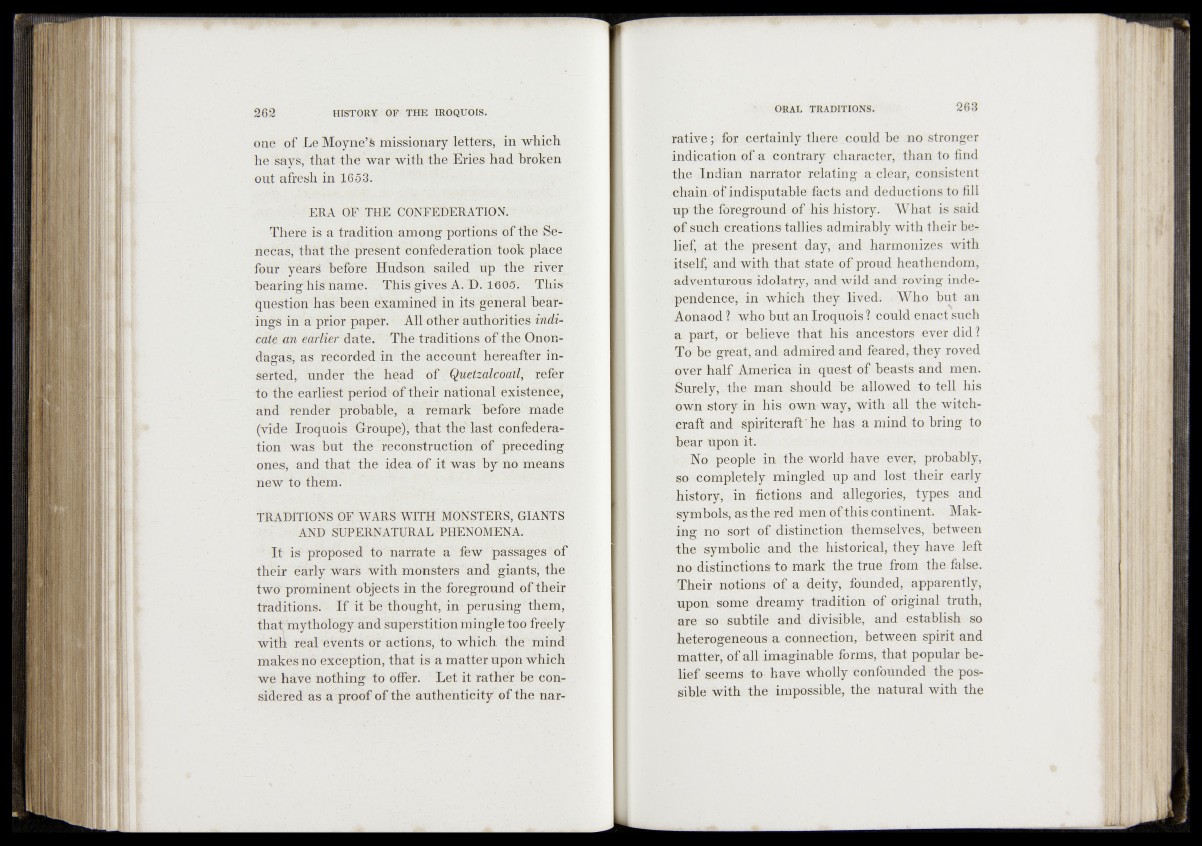
one of Lé Moyne’& missionary letters, in which
he says/ tliat. fho war with the Eries had broken
out afresh hi f .
E R A O F T H E CO N FED E R A T IO N .
There is a traditiomamong portions of the Senecas,
that the present confederation took plane
four ^éard befóïé Hudson sailed up the /nV‘£rJ
bearing his name. This gives A. D. 1605'. This
question has been examined in its'general bearings
in a prior paper. Alt other authorities iwdi*
cate an earlier date. The traditions of the Onon-
dkgas, as recorded in the aocéunt hereafter inserted,
under the head o f; Qüetzalcoail, refer
to the earliest period of their national existehce,
and render probable, a remark before made
(Vide Iroquois (troupe); that, the" last confederation
was but the reconstruction of preceding
ones, and that the ijdea of it was by no means
new to them.
T R A D IT IO N S O F W A R S W IT H M O N S T E R S , G IA N T S
A N D SU P E R N A TU R A L PH EN OM EN A .
It is proposed to narrate a few passages of
their early wars with monsters“and giants, the
two prominent objects in the foreground of their
traditions; - If it be thought, in perusing them,
that mythology and superstition naingle too freely
with real events or actions, to which the mind
makes nó exception, that is a matter upon which
we have nothing to offer. Let it rather be considered
as a proof of the authenticity of the narrativei
for certainly there „could be no stronger
Ihdieation Of a contrary character, than to find
the Indian narrator relating a clear, consistent
chain-of indisputable facts and deductions to fill
up the foreground of bis history. What is said
of such creations tallies admirably with their be*
lief, at the present day, and harmonizes with
itself, and with that state of proud heathendom,
adyenfufous idolatry, and wild, and roving inder
pendenee, ip which they lived: Who hut an
Aonaod ? who but an Iroquois?: could enact such
a part, or believe that his ancestors ever did ?
Tu be great, and admired and feared, they roved
over half America in quest ©f beasts-and men.
Surely,', the man should be allowed to-tell his
own story in his own-way, with all the witchcraft
and spiritcraft he has- a mind to bring to
bear upon it.
No people in the world have ever, probably,
so completely mingled up and lost. their early
history, in . fictions and allegories, types and
symbols, as the ved men of this cont inent» - Making
no sort of distinction themselves, between
the symbolic . and the historical, they have left
no distinctions to mark the true from the false.
Their notions of a deity, founded, apparently,
upon some dreamy tradition of original truth,
are so subtile and divisible, and establish so
heterogeneous a connection, between spirit and
ihatter, of all imaginable Tornis, that popular belief
seema to have wholly confounded the possible
with the impossible, the natural with the